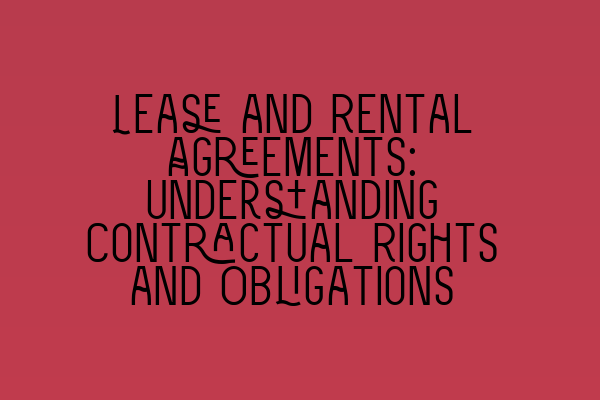Lease and Rental Agreements: Understanding Contractual Rights and Obligations
As a solicitor practicing in contract law, one of the most common areas I encounter is lease and rental agreements. Whether you are a landlord or a tenant, it is crucial to have a clear understanding of your contractual rights and obligations to ensure a smooth and mutually beneficial arrangement. In this blog post, I will provide an overview of lease and rental agreements, highlighting key points that both parties should be aware of.
First and foremost, let’s define what a lease and rental agreement is. In simple terms, it is a legally binding contract between a landlord (the property owner) and a tenant (the person renting the property) that outlines the terms and conditions of the rental arrangement.
Now, let’s dive deeper into the essential aspects of lease and rental agreements:
1. Duration and Termination: Lease agreements typically have a fixed duration, commonly known as the “term.” This term can range from a few months to several years. On the other hand, rental agreements are usually month-to-month and can be terminated by either party giving proper notice. It is vital to understand the specific duration and termination provisions mentioned in the agreement, as they dictate the length of the tenancy and the conditions under which it can be ended.
2. Rent and Payment Terms: The agreement should clearly state the amount of rent, the due date, and any penalties for late payment or bounced checks. It is essential for both landlords and tenants to understand their respective obligations when it comes to rent payment. Landlords depend on timely rent payments to cover property expenses, while tenants should adhere to the agreed-upon payment schedule to avoid legal consequences.
3. Maintenance and Repairs: Responsibilities for property maintenance and repairs can vary depending on the terms outlined in the agreement. Generally, landlords are responsible for maintaining the property’s structural integrity and ensuring that it complies with health and safety regulations. Tenants, on the other hand, are typically responsible for day-to-day maintenance and minor repairs. It is crucial to review the lease or rental agreement thoroughly to understand who is responsible for what.
4. Security Deposits and Return: Most lease and rental agreements require tenants to pay a security deposit upfront, which is held by the landlord as collateral against any damage or unpaid rent. The agreement should clearly specify the amount of the deposit, the conditions under which it may be used, and the process for its return at the end of the tenancy. As a landlord, ensuring compliance with deposit laws is essential to avoid potential legal disputes.
5. Property Use and Restrictions: Lease and rental agreements often include clauses that outline how the rented property can be used. These clauses may restrict certain activities or limit the number of occupants. It is crucial for tenants to understand these restrictions to avoid violating the agreement and unnecessary consequences. Landlords, on the other hand, should ensure that the agreed-upon restrictions are reasonable and enforceable.
6. Default and Remedies: In the unfortunate event of a breach of the lease or rental agreement, it is important to understand the consequences and available remedies. The agreement should outline the actions that can be taken by both parties in case of default, such as eviction or legal action. Understanding the potential ramifications of breach and the options for resolution is essential for both landlords and tenants.
By now, you should have a solid understanding of the key points to consider in lease and rental agreements. Whether you are a landlord or a tenant, it is crucial to seek legal advice and ensure that the agreement accurately reflects both parties’ intentions and protects their interests.
If you are preparing for the SQE exam and looking for practice quizzes and mocks, be sure to check out our related articles:
– SQE 1 Practice Exam Questions
– SQE 1 Practice Mocks FLK1 FLK2
If you are interested in SQE 2 preparation courses or SQE 1 preparation courses, we have comprehensive programs designed to help you succeed in your exams.
Keep in mind that the SRA SQE exam dates are also available for reference, ensuring you have accurate information when planning your exam preparation.
Remember, a solid understanding of lease and rental agreements is essential for both landlords and tenants. By knowing your contractual rights and obligations, you can navigate the rental process with confidence and minimize potential disputes. Seek legal advice when needed, and always review and understand the terms of the agreement before signing.
Disclaimer: This article is for informational purposes only and should not be considered legal advice. Always consult with a qualified solicitor for specific legal guidance tailored to your situation.
#SQE #ContractLaw #LeaseAgreements #RentalAgreements #LegalAdvice #Solicitor
